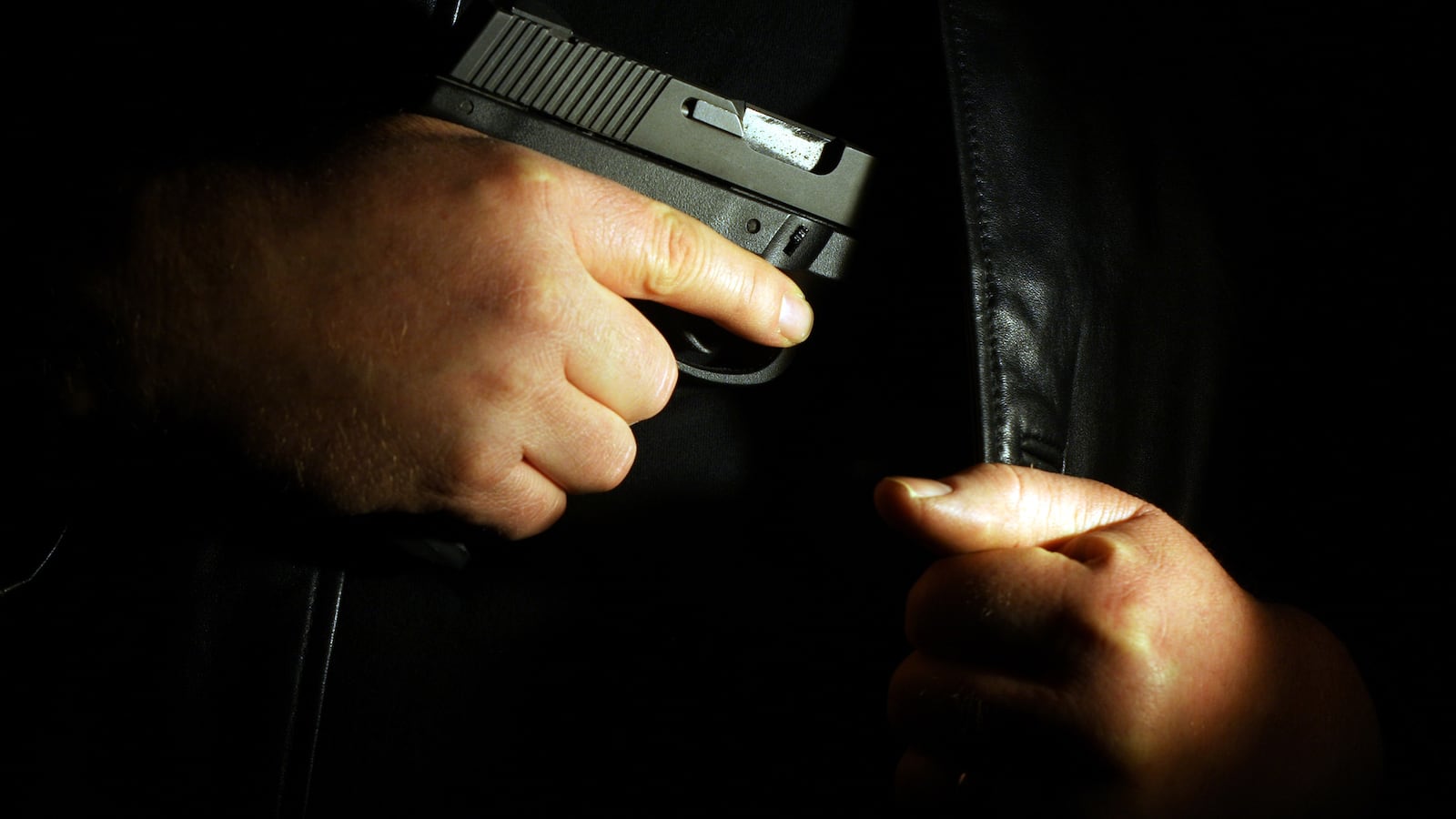The possibility of a person walking through a crowded national park, or even your local playground, with a gun concealed on his hip may not be as unlikely as it once seemed. That’s because over the past few days a remarkable amount of progress has been made on a bill that would force states to recognize concealed carry permits from other states.
It’s the National Rifle Association’s dream bill. And it is closer than it has ever been to becoming law.
This week the House Judiciary Committee passed the Concealed Carry Reciprocity Act of 2017 (PDF), which also would allow off-duty officers to carry weapons in school zones, after the NRA labeled the legislation its “highest legislative priority in Congress.”
The act would force states with high barriers for obtaining those permits—like requiring firearm training, drinking-age requirements, or barring convicted stalkers from attaining a permit—to recognize gun permits from states that have lower thresholds for obtaining firearms, including issuing them to 18-year-olds and people with misdemeanors for domestic abuse.
That’s why many prosecutors and law-enforcement groups, especially from urban areas, hate the bill, but also why conservative lawmakers love it.
“We have low crime rates, and that’s because we actually have people that are carrying,” Rep. Raul Labrador (R-ID) told The Daily Beast. “The more people carry, the lower crime will be. Apparently, they like the high crime in their states.”
The bill has a whopping 210 co-sponsors in the House. Its author, Rep. Richard Hudson (R-NC), has told party leaders it has the votes to sail through the House and could be approved by the lower chamber as early as next week.
The Senate is another story, because most legislation still needs to meet the 60-vote threshold to gain approval. But even there, momentum is building. While Republicans only maintain a 52-seat majority, some vulnerable Democratic senators who are on the ballot next year are open to supporting the measure.
“I’d be inclined to support it, but I’ve got to look at it,” Sen. Jon Tester (D-MT) told The Daily Beast on the day it passed the crucial House committee. “I think it makes things a lot more simpler [sic] for folks, but, like I said, I haven’t studied the bill. Haven’t really done my due diligence on it.”
While most Democrats have been advocating for stricter gun-control measures in the wake of recent mass shootings, the calculus is different for Democrats representing states Trump won by large margins in 2016. Sen. Heidi Heitkamp (D-ND) is a top target for the GOP in the 2018 midterms. She’s supported a version of the concealed-carry bill in the past. Like Tester, she’s not familiar with the details of the new NRA-endorsed proposal but from her perch in the Midwest the broad idea makes sense.
“I used to manage the reciprocity system in North Dakota, and I think for a lot of people who move across state borders it can be confusing and trap people, but I need to study it,” Heitkamp told The Daily Beast.
When The Daily Beast asked vulnerable Indiana Democrat Joe Donnelly about the proposal he demurred.
“Just give my office a call,” Donnelly said while flashing a smile that read: I’m not touching that issue if I don’t have to.
His office never responded to multiple requests for comment.
Democratic Rep. Kyrsten Sinema is vying to replace retiring Republican Sen. Jeff Flake in Arizona. Her office refused to say how she would come down on the bill, stating that she’s not on the Judiciary Committee and hasn’t reviewed the proposal yet.
Another Democratic target for the bill is Sen. Joe Manchin (D-WV), who is so bullishly pro-gun that he famously shot a piece of legislation with a rifle in a campaign ad. He also declined to commit either way on the proposal.
“I haven’t even heard about that,” Manchin told The Daily Beast. “I’m in hand to hand combat right now on taxes.”
But Manchin will be hearing about it soon, especially if the House sends it over to his chamber in December. Sen. Cory Gardner (R-CO) is running the Senate Republican campaign arm this election cycle, and he predicts the gun rights debate that’s playing out in the Capitol will be a prominent component of many Senate races across the country next year.
“In the states that we have senators up for reelection they’re strong pro-Second Amendment states,” Gardner told The Daily Beast, before adding that he thinks many Democratic incumbents are vulnerable on gun issues. “I think it will be clear that they’ve not been as strong as they should be within their conference on it.”
Ultimately, Republicans would need to flip eight Democrats or Independents who caucus with Democrats in order to get concealed carry reciprocity into law. And other vulnerable Democrats have given no indication that they’d consider the measure, even when facing a difficult re-election campaign. Sen. Claire McCaskill (D-MO) is a former prosecutor and shares the fears of many in the law enforcement community about forcing police officers to recognize gun permits from across the vast nation. She also calls the measure hypocritical for putting one state’s law above the will of voters in other states.
“I just don’t understand why we need to blow up the 10th Amendment. I don’t understand,” McCaskill told The Daily Beast. “The people who are pushing this are the same people who have been lecturing me on state’s rights for years. State’s rights are state’s rights.”
Though McCaskill may oppose the bill on its own, there is a chance that she could be forced to consider it as part of a larger package of other gun-policy-related measures. On the day the House Judiciary Committee approved the concealed carry bill, it also passed a bipartisan proposal aimed at enhancing the National Instant Criminal Background Check System, referred to as NICS. That effort has quickly picked up bipartisan support in the wake of the Texas church shooting that revealed the Air Force has failed to report domestic abuse convictions to the national database.
House Republicans tell The Daily Beast that party leaders are now pushing to combine the controversial concealed carry bill with the broadly bipartisan NICS bill—a development Politico reported was growing likely as of Thursday afternoon.
Not everyone in the GOP is eager, however, to combine the two measures, fearful that the party may end up scuttling both by doing so. Sen. John Cornyn is the No. 2 Republican in the Senate. He helped forge the compromise on the background-check system after the church massacre in his home state, and he wants his party to stay focused on one issue at a time.
“It’s really important and will save lives, but if we start trying to add other things to it than we risk not doing anything, which has sort of been the fate of a lot of legislation we’ve tried in the past,” Cornyn told The Daily Beast.






